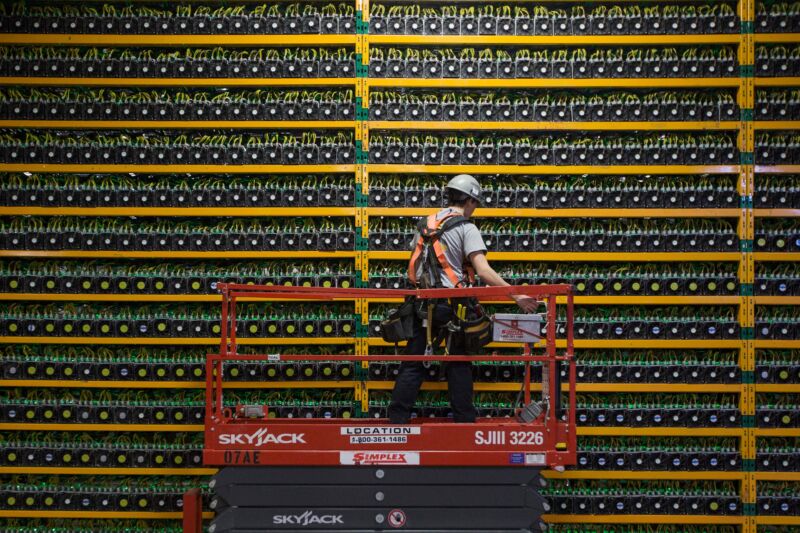
Lars Hagberg / AFP
Bitcoin has a voracious appetite for energy, a foundational characteristic of the cryptocurrency that some environmental groups say they are hoping to change.
A new pressure campaign, called Change the Code Not the Climate, launched Tuesday, and it’s seeking to encourage bitcoin luminaries like Elon Musk, Jack Dorsey, and Abby Johnson, CEO of Fidelity Investments, to push for changes that would slash bitcoin’s energy use.
The campaign is being organized by advocacy organizations Greenpeace and the Environmental Working Group. Chris Larsen, who cofounded Ripple Labs, a cryptocurrency and payments company, has pledged $5 million to fund the campaign, though his participation is reportedly not on behalf of the company.
Bitcoin’s profligate energy use—and the carbon pollution associated with it—are rooted in the cryptocurrency’s proof-of-work approach to validating transactions on its blockchain. Proof of work requires participants to crunch evermore challenging cryptographic proofs to perform the validations and earn bitcoin as a reward. As mining bitcoin has become harder, the network has drawn more energy—as much energy as entire countries. A recent estimate by the Cambridge Centre for Alternative Finance found that bitcoin consumes more energy on an annualized basis than Norway.
“This is a big problem. In part because of where the industry stands now but also because of our concerns about its growth,” Michael Brune, a former executive director of Sierra Club who is advising the campaign, told The Guardian.
“Coal plants which were dormant or slated to be closed are now being revived and solely dedicated to bitcoin mining. Gas plants, which in many cases were increasingly economically uncompetitive, are also now being dedicated to bitcoin mining. We are seeing this all across the country,” he said.
To counter the resulting criticism, some miners have shifted to buying renewable energy to power their rigs. But Brune and Larsen counter that that’s not sufficient. Indeed, there’s no excess of renewable power right now, and for the climate’s sake, any renewable power that goes unused should probably be stored for later use. If anything, the continued operation of fossil fuel power plants suggests that there’s not a surplus of cheap renewable power or storage.
The campaign is hoping to prod bitcoin into reducing its energy use by 99.9 percent by switching to so-called proof of stake, where validators who own the blockchain’s coin stake some of their coins. The group was likely inspired by ethereum, which is in the process of switching from proof of work to proof of stake with a goal of slashing its energy use by 99 percent.
Ethereum’s migration could serve as a cautionary tale, though. Founder Vitalik Buterin said that the process was taking far longer than expected. “[We thought] it would take one year to [implement] POS… but it actually [has] taken around six years,” he said at the StartmeupHK virtual festival in May 2021. Currently, the switch is expected to take place in the next few months.
